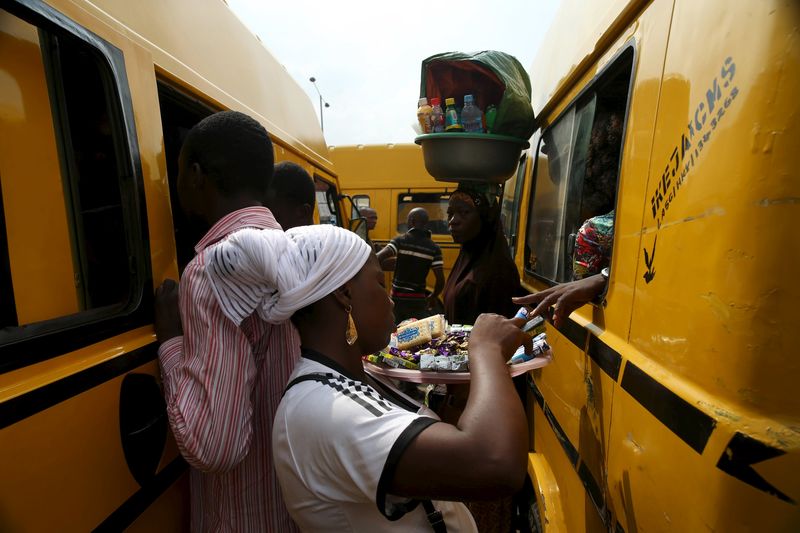By Ulf Laessing
LAGOS (Reuters) - When Nigerian driver Ossy Okafor gets in his beat-up minibus and begins another battle on the congested roads of Lagos, he sees everything wrong with Africa's biggest economy.
By 7 a.m., several million people are trying to get to work. No public rail network exists and not enough highways link the residential and commercial quarters.
Okafor charges about 200 naira, or $1, to drive some of them, navigating through a labyrinth of narrow, pot-holed roads. On this day, he's crammed 17 people - two or three more than the maximum capacity - into his 20-year old VW, one of thousands of so-called 'Danfo' minibuses.
"The type of suffering we meet on the road is terrible," 55-year-old Okafor said.
President Muhammadu Buhari wants a third of next year's budget to go for capital expenditure - building roads and hospitals - in a bid to break a decades-long pattern in Africa's top oil producer: revenues from crude enriching just a small elite.
One morning with Okafor, ferrying commuters across Lagos, Nigeria's commercial capital and the continent's largest city, shows how hard that will be.
Most of Lagos' 20 million people live in modest residential quarters on the mainland or endless slums around the city's main lagoon, far from the business districts of Victoria or Lagos island.
Many get out of bed before dawn to catch a bus over the 12-km (seven mile) Third Mainland bridge, the main causeway linking the mainland to Lagos Island. Crossing can take as long as three hours in rush hour.
"I get up at 4 a.m. and need two hours to come to work," said 50-year-old chauffeur Philip Achleh, sitting in a Danfo as the driver honked at rival buses before plunging into the chaos on the Third Mainland Bridge.
With no air conditioning and flies buzzing around, sweaty passengers sleep while their bus lurches slowly forward. One woman gave up in the middle of the bridge, getting out and walking, hoping it would be quicker.
CORRUPTION
Under Buhari, authorities are investigating high officials for corruption, which the president says has cost the treasury $150 billion over the past decade. Danfo drivers see graft at the grass roots, with on-the-spot "fines" imposed for such minor violations as switching lanes.
Before picking up passengers, drivers and conductors scan the crowd for officials or union reps, who also demand road "fees". Toyin Ogunseye, another minibus driver, handed 200 naira to a union official who popped up just as he was about to leave the mainland terminus.
Okafor just sighed when asked about corrupt state officials. "I don't even want to talk about government agencies," he said.
After a long day, he is left with 5,000 naira for him and his conductor. Half his ticket sales have been spent covering union fees or police "fines", he said.
TIRED, TIRED
China's state-owned China Civil Engineering Construction Corp has been building a Lagos light railway since 2011, but the project has been delayed. The first of an initial six lines will not be ready until the end of next year, city governor Akinwunmi Ambode said last month.
He said the project would ease congestion and create jobs for 200,000 people, but tenders for the new line have yet to be opened, suggesting completion is years away.
His transport commissioner could not be reached for comment. Officials have blamed the delays on the difficulty in clearing a way through the teeming slums.
Liborous Oshoma, a Lagos-based lawyer, also blamed late or non-payment of contractors - a recurring problem in Nigeria after this year's collapse in oil prices.
"It is typical of every government project in Nigeria," he said. "Projects are budgeted for and the bulk of the money is diverted into other things."
Time is not on Nigeria's side. Its population is forecast to exceed 300 million by 2050, from around 170 million now, according to the United Nations.
Every day, Lagos - a mega-city whose economy is larger than Kenya's - attracts thousands of unemployed youngsters from upcountry looking for work in its banks, stock market, and booming services.
Perhaps the biggest impact of the congestion is that most people arrive at work exhausted after three hours on the move. It is normal to see Lagosians in elegant suits napping before entering their offices - dozing in the office car park or elevators.

After work, the commuter caravan starts again with the mainland bridge clogged by the afternoon. "I get home at 8 p.m.," said Achleh, the chauffeur. "I get home very, very tired, have dinner, relax and go to bed. I don't have much of a life."